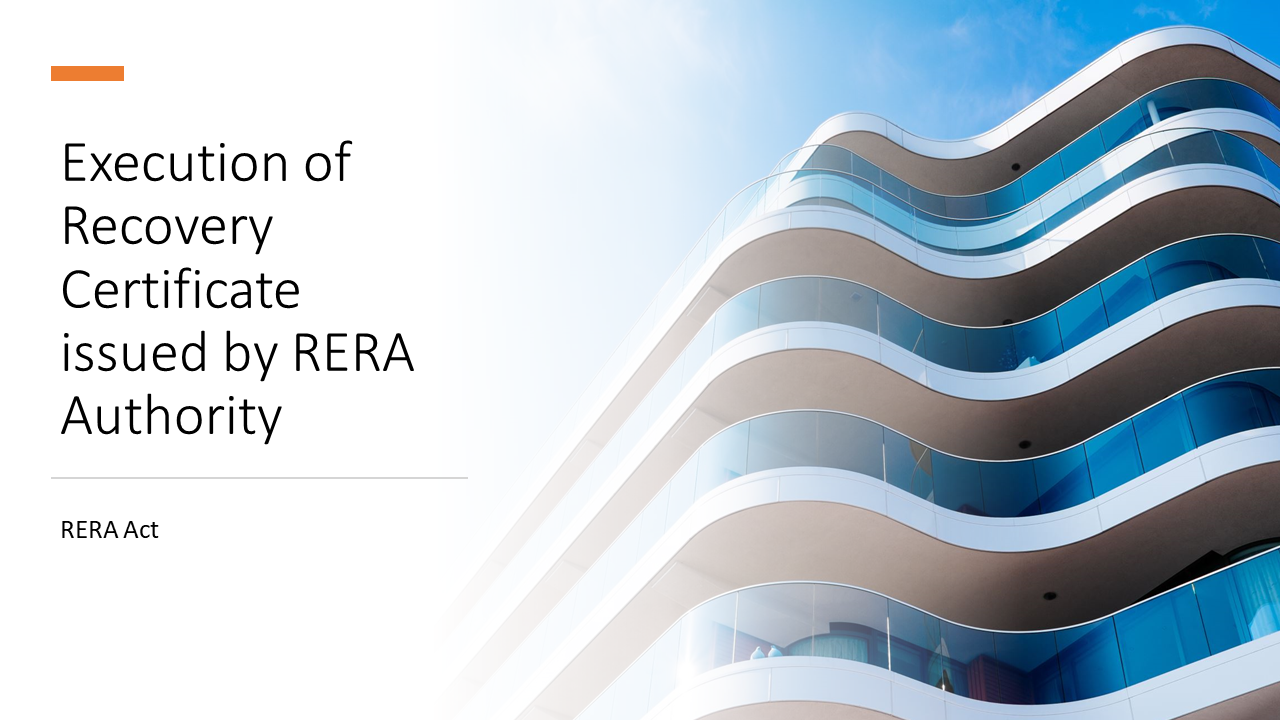Introduction:
As per the statistics released at the 125th meeting of the Uttar Pradesh RERA Authority, held in Lucknow, nearly 8,800 Recovery Certificates (RCs), collectively valued at around Rs 2,400 crore, have been issued across the state of Uttar Pradesh from 2018 till 2023. Of this, approximately Rs 1,200 crore has been recovered from the defaulters. Similarly, a report from the District Revenue Officer (DRO), Gurugram has revealed that in the same period, the Haryana Real Estate Regulatory Authority (HRERA), Gurugram issued 240 recovery certificates against several defaulter builders, but only 1 had been realized so far.
Understanding Recovery Certificates:
A recovery certificate is issued by any state RERA Authority under Section 40(1) of the Real Estate (Regulation and Development) Act, 2016, according to which if a promoter, allottee, or real estate agent fails to pay any interest, penalty, or compensation imposed on them by the adjudicating officer or RERA Authority these outstanding dues shall be recoverable from them as arrears of land revenue.
The realization of money as arrears of land revenue is the responsibility of district administrations (collector) as per the revenue act/code applicable in the state. Therefore, RERA in order to collect its money sends a formal request to the concerned officer either the District Collector or District Magistrate, as applicable, and this formal request is called a Recovery Certificate or Recovery Citation.
Execution of Recovery Certificates:
As stated earlier while the issuance of RCs falls under Rera’s purview, the realization of money and the recovery proceedings are the responsibility of the District Collector/ District Magistrate/ District Revenue Officer, which is mostly sub-delegated to the local SDM or the Tehsildar.
The process involves various steps, including issuing a ‘writ of demand’ by the Tahsildar calling the defaulter to appear or pay the amount within the time specified. If the defaulter fails to comply, revenue officials may resort to several measures like attachment and sale of movable/immovable property, including but not limited to cars, bank accounts, or bank lockers, or can also lead to the arrest of the defaulter for a small period, etc.
Recourse in case of Delay/Failure in Execution of Recovery Certificate:
If the Tahsildar or revenue officer delays or fails to execute the Recovery Certificate, the aggrieved party can approach the Collector with written representation requesting the issuance of the Recovery Certificate. If even after giving the written representations and regular reminders no action is taken place for the execution of the Recovery Certificate then seeking intervention from the Hon’ble High Court through a writ of mandamus can expedite the process.
The Hon’ble High Court may issue a writ of mandamus either directing the RERA to ensure execution of the recovery certificate by initiating execution proceedings as per Rule 24 or it may also direct the Collector to enforce the recovery citation within a time-bound manner. However, it’s crucial to ensure that orders from the High Court are communicated promptly to the Collector and Tahsildar for timely action. The non-compliance of the orders of the Hon’ble High Court by the Collector can lead to contempt proceedings being initiated by the aggrieved party before the Hon’ble High Court.
Conclusion:
The efficient execution of Recovery Certificates is vital for ensuring accountability in the real estate sector and safeguarding the interests of buyers. In the author’s perspective, RERA Authorities possess powers akin to those of a civil court for enforcing their orders. However, it appears that these extensive powers remain largely untapped. To streamline the process of Recovery Certificate (RC) execution and the subsequent realization of dues, it’s imperative for RERA Authorities to effectively utilize these powers. This can be achieved by imposing compliance deadlines on Collector offices.
A notable example is the approach adopted by the Delhi RERA, which directly solicits compliance reports from the Sub-Divisional Magistrate (SDM) office post the issuance of RC. Such proactive measures not only enhance accountability but also expedite the entire process, ensuring timely resolution for all parties involved and it also saves the parties from the cost of unnecessary litigation. It’s time for RERA Authorities across regions to embrace similar practices, maximizing the efficacy of their mandates for the benefit of stakeholders.

